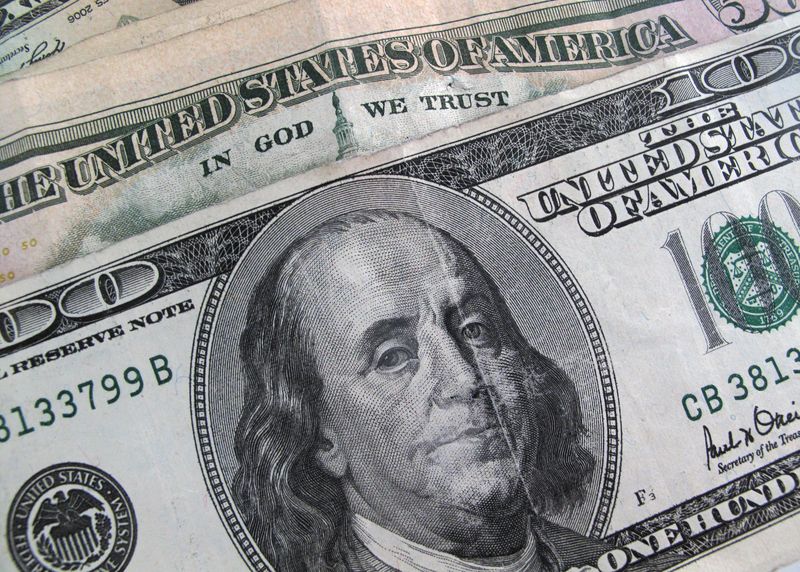By Rae Wee
SINGAPORE (Reuters) -The greenback rose broadly on Monday and cryptocurrencies jumped as trades for a victory by Donald Trump within the upcoming U.S. elections gathered steam within the wake of an tried assassination of the previous U.S. President.
Buying and selling was thinned within the Asian session with Japan out for a vacation, although information of the Trump capturing dominated the market temper and had traders narrowing the chances of a Trump victory come November.
The tried assassination most likely enhances Trump’s “reputation for strength”, stated Jack Ablin, chief funding officer at Cresset Capital.
On-line betting web site PredictIT has a Republican win at 66 cents, from 60 cents on Friday, with the Democrats at 38 cents. The present odds point out that Republicans are twice as prone to win the election as Democrats.
That despatched the greenback rising broadly, which left the euro easing 0.14% to $1.0895, whereas sterling fell 0.09% to $1.2978.
Money U.S. Treasuries have been untraded in Asia on Monday owing to the Japan vacation, however 10-year Treasury futures edged decrease, indicating yields will rise when money buying and selling begins later within the day. Bond yields transfer inversely to costs.
“The market reaction function to a Trump presidency has been characterised by a stronger U.S. dollar and a steepening of the U.S. Treasuries curve, so we might observe some of that this coming week if his election odds are assessed to have further improved following this incident,” stated Rong Ren Goh, a portfolio supervisor at Eastspring Investments.
Crypto costs equally surged in anticipation of a Trump win, with bitcoin final up 9% at $62,760. Ether jumped greater than 7% to $3,336.80.
Trump has offered himself as a champion for cryptocurrency, though he has not provided specifics on his proposed crypto coverage.
In different currencies, the Australian greenback eased 0.13% to $0.6775, whereas the New Zealand greenback slid 0.3% to $0.6100.
The was little modified at 104.20.
Below a Trump presidency, market analysts count on a extra hawkish commerce coverage, much less regulation and looser local weather change laws.
Traders additionally count on an extension of company and private tax cuts expiring subsequent yr, fuelling issues about rising finances deficits underneath Trump.
STILL STRUGGLING
Headlines from China additionally grabbed traders’ consideration on Monday, as information confirmed the world’s second-largest financial system grew a lot slower than anticipated within the second quarter, weighed down by a protracted property downturn and as job insecurity squeezed home demand.
Separate figures launched earlier within the day confirmed China’s new residence costs fell on the quickest tempo in 9 years in June, with the battered sector struggling to discover a backside regardless of authorities assist measures to regulate oversupply and bolster confidence.
The hardly reacted to the info and solely barely prolonged its losses from earlier within the session to final commerce 0.13% decrease at 7.2602 per greenback within the onshore market.
“On net, it’s a negative outcome. It does show that the second-quarter growth momentum appears to be weakening,” stated Alvin Tan, head of Asia FX technique at RBC Capital Markets.
“The second-quarter momentum weakening kind of implies that we’ll need more support to get the economy to the 5% target for the whole year.”
China’s once-in-five-year gathering of high officers, which normally ushers in coverage adjustments, kicked off on Monday and the four-day plenum will probably be watched for measures to assist the patchy restoration on the planet’s second-largest financial system.

Elsewhere, the yen reversed a few of its good points from late final week and final stood at 157.95 per greenback, although remained not too removed from a roughly one-month excessive of 157.30 hit on Friday.
Tokyo was thought to have intervened out there to prop up the battered Japanese foreign money final week within the wake of a cooler-than-expected U.S. inflation report, with Financial institution of Japan information suggesting that authorities might have spent as much as 3.57 trillion yen ($22.4 billion) to take action on Thursday.




